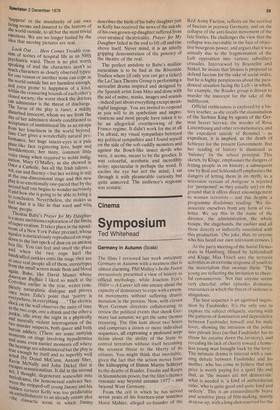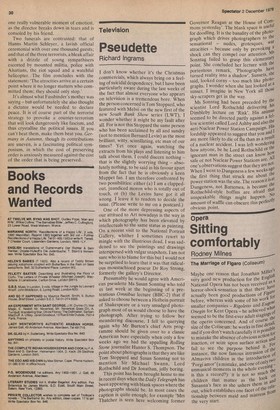Cinema
Symposium
Ted Whitehead
Germany in Autumn (Scala) The films I reviewed last week anticipate Germany in Autumn with a neatness that is almost alarming. Phil Mulloy's In the Forest persuasively presented a view of history as official mythology, while Joachim Fest's Hitler— A Career left one uneasy about the capacity of democracy to cope with extreniist movements without suffering drastic mutation in the process. Now, with eleven West German directors collaborating to review the political events that shook Germany last autumn, we get the same themes recurring. The film lasts about two hours and comprises a dozen or more individual sequences, all expressing a profound scepticism about the ability of the State to control terrorism without itself becoming the severest threat to the liberty of its citizens. You might think that inevitable, given the fact that the action moves from the kidnapping of Hanns Martin Schleyer to the deaths of Baader, Ensslin and Raspa in Stammheim prison, but the film's themes resonate way beyond autumn 1977 – and beyond West Germany. From the cell in which he has served seven years of his fourteen-year sentence Horst Mahler, alleged co-founder of the Red Army Faction, reflects on the survival of fascism in postwar Germany, and on the collapse of the anti-fascist movement of the late Sixties. He challenges the view that the collapse was inevitable in the face of objective bourgeois power, and argues that it was actually due to the fragmentation of the Left opposition into various subsidiary crusades. Interviewed by Brustellin and Sinkel, he insists that Strauss is prepared to defend fascism for the sake of social order, but he is highly perspicuous about the paradoxical situation facing the Left – in which, for example, the Baader group is driven to murder the innocent for the sake of the indifferent.
Official ruthlessness is explored by a history teacher, as she recalls the assassination of the Serbian King by agents of the -German Secret Service, the murder of Rosa Luxembourg and other revolutionaries, and the expedient suicide of Rommel – as expedient, it is implied, as the death of Schleyer for the present Government. But her reading of history is dismissed as 'baloney' by the school principal. This sketch, by Kluge, emphasises the dangers of letting people in on history; a subsequent one by Boll and Schlondorff emphasises the dangers of letting them in on myth, as a television version of Antigone is rejected (or 'postponed' as they usually say) on the ground that it offers direct encouragement to women terrorists – and this despite a programme disclaimer reading: 'We disassociate ourselves from any form of violence. We say this in the name of the director, the administration, the whole troupe, the stagehands, the cashier and all those directly or indirectly associated with this production.' (No joke, that, to anyone who has faced our own television censors.) At the party meeting of the Social Democrats in Hamburg, filmed by Schlondorff and Kluge, Max Frisch sees the terrorist activities as an extreme response of youth to the materialism that swamps them: 'The young are reflecting the invitation to cheerful consumerism.' Not that anyone seems vety cheerful: other episodes dramatise encounters in which the threat of violence is ubiquitous.
The best sequence is an agonised inquisition by Fassbinder. It's. the only one to explore the subject obliquely, starting with the patterns of domination and dependence between Fassbinder himself and his male lover, showing the intrusion of the police into private lives (so that Fassbinder has to throw his cocaine down the ,lavatory), and revealing his lack of charity toward a homeless young man brought back by the lover. The intimate drama is intercut with a running debate between Fassbinder and his mother, who has come to pclieve that any price is worth paying for a quiet life and that, as 'the masses are not democratic' what is needed is 'a kind of authoritarian ruler, who is quite good and quite kind and orderly'. This is an extraordinarily brave and sensitive piece of film-making, mainly in close-up, with a long shot reserved for the one really vulnerable moment of emotion, as the director breaks down in tears and is consoled by his friend.
Two funerals are contrasted: that of Hanns Martin Schleyer, a lavish official ceremonial with over one thousand guests; and that of the three terrorists, a bleak affair with a drizzle of young sympathisers escorted by mounted militia, police with Alsatians, the riot squad and a watchful helicopter. The film concludes with the statement: 'The atrocities arrive at a certain point where it no longer matters who committed them; they should only stop.'
It's almost what Fassbinder's mother was saying — but unfortunately she also thought a dictator would be needed to declare peace. It is of course part of the terrorist strategy to provoke a counter-terrorism that will look dangerously like fascism, and thus crystallise the political issues. If you can't beat them, make them beat you. Germany in Autumn, though its contributions are uneven, is a fascinating political symposium, in which the cost of preserving order is anxiously measured against the cost of the order that is being preserved.







































 Previous page
Previous page